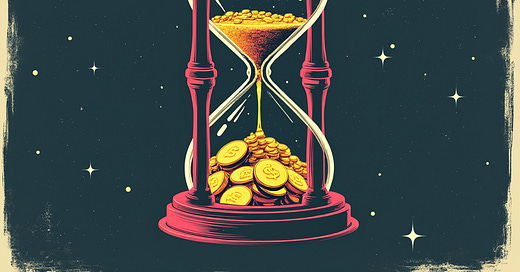Sydney, October 2024
"The men who can manage men manage the men who can manage only things, and the men who can manage money manage all." — Will & Ariel Durant, The Lessons of History
Ah, money. That elusive green paper that seems to be the root of all our problems – and yet, we can’t seem to live without it.
But what if I told you that money is actually just stored time? Spend a couple minutes on me, will ya?
Imagine money as a scale — on one side, you have time, and on the other, cash.
To make money, you need to invest your precious hours.
And you can buy back your time by spending that hard-earned cash.
Talk about a twist of irony.
Need someone to clean your house? Boom! You just traded some dollars for a few hours of your life back. Or consider that beautiful painting you bought; not only did you snag a piece of art, but you also purchased the stored time of the painter (and let’s not forget their talent).
This perspective isn’t just helpful; it’s downright enlightening! It gives you a clear motivation: Leverage your time to make money.
You might think that working efficiently at your job or freelancing is the way to go. But let’s face it – those methods scale linearly. It’s like trying to fill a bathtub with a teaspoon; it’ll take forever. You could be there all day while your dreams of financial freedom float away like rubber duckies.
Think of it as a time bank where you can exchange hours for dollars and vice versa.
Time Well Spent
True leverage comes from owning something valuable – something exponential. Think about it: building products that people actually want or investing in assets that appreciate over time.
Assets decouple you from the traditional input-output mentality, where your earnings are directly tied to the hours you put in. Instead of trading time for money, you create systems and investments that work for you, while you focus on what truly matters – whether that's spending time with loved ones or pursuing passions. It’s like planting a money tree instead of just watering your hourly wage.
But wait! Before you dive into this financial utopia, let’s address the elephant in the room: Are you wasting your time?
Well, that depends.
Picture this: You spend an hour assembling IKEA furniture to save a few bucks. Sure, you might think you're saving money by doing it yourself, but how much is your time worth? If you end up wrestling with a confusing instruction manual and cursing at Allen wrenches, that hour might cost you more in frustration than the money you saved. On the other hand, if you’re assembling it with friends over pizza and laughter, then that hour is pure gold – an investment in memories rather than just furniture.
Life is finite; we only have so many hours to spend, so if anything, you'd hope to spend your time wisely.
Conclusion
Thinking of your time and your money as interchangeable stores of value gives you a powerful framework for decision-making. It’s all about deciding when to trade one for the other.
In closing, remember this: Money may not solve all your problems (in fact, it might create a few), but viewing it as stored time can help you make smarter decisions about how you spend both.
Catching! The penny drops. 🪙






Yes, but remember that the exchange rate for the time-to money-and-back is always very unfavorable, no matter how you look at it. When in doubt, just check out the Zeitwertkonto descriptions :-)
you can always make more money but you will never make more time